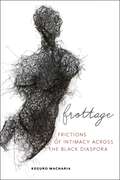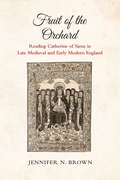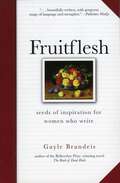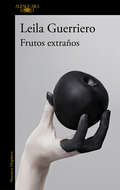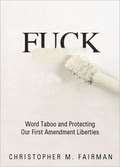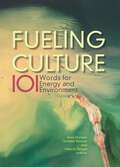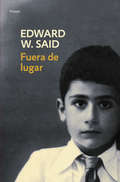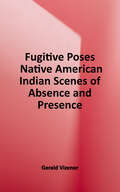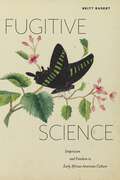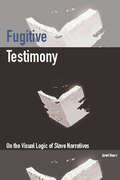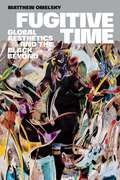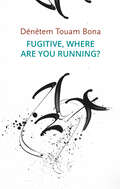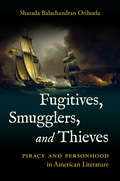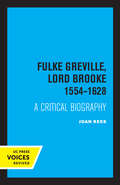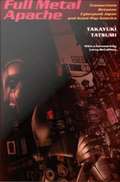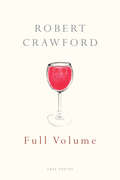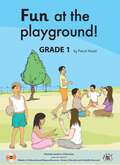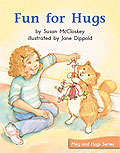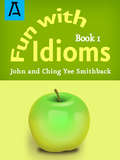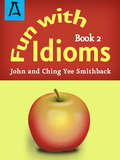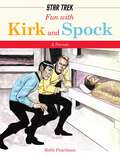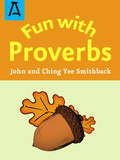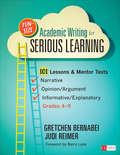- Table View
- List View
Frottage: Frictions of Intimacy across the Black Diaspora (Sexual Cultures #11)
by Keguro MachariaWinner, 2020 Alan Bray Memorial Prize, given by the GL/Q Caucus of the Modern Language AssociationA new understanding of freedom in the black diaspora grounded in the erotic In Frottage, Keguro Macharia weaves together histories and theories of blackness and sexuality to generate a fundamentally new understanding of both the black diaspora and queer studies. Macharia maintains that to reach this understanding, we must start from the black diaspora, which requires re-thinking not only the historical and theoretical utility of identity categories such as gay, lesbian, and bisexual, but also more foundational categories such as normative and non-normative, human and non-human. Simultaneously, Frottage questions the heteronormative tropes through which the black diaspora has been imagined. Between Frantz Fanon, René Maran, Jomo Kenyatta, and Claude McKay, Macharia moves through genres—psychoanalysis, fiction, anthropology, poetry—as well as regional geohistories across Africa and Afro-diaspora to map the centrality of sex, gender, desire, and eroticism to black freedom struggles. In lyrical, meditative prose, Macharia invigorates frottage as both metaphor and method with which to rethink diaspora by reading, and reading against, discomfort, vulnerability, and pleasure.
Fruit of the Orchard: Reading Catherine of Siena in Late Medieval and Early Modern England
by Jennifer N. BrownFruit of the Orchard sheds light on how Catherine of Siena served as a visible and widespread representative of English piety becoming a part of the devotional landscape of the period. By analyzing a variety of texts, including monastic and lay, complete and excerpted, shared and private, author Jennifer N. Brown considers how the visionary prophet and author was used to demonstrate orthodoxy, subversion, and heresy. Tracing the book tradition of Catherine of Siena, as well as investigating the circulation of manuscripts, Brown explores how the various perceptions of the Italian saint were reshaped and understood by an English readership. By examining the practice of devotional reading, she reveals how this sacred exercise changed through a period of increased literacy, the rise of the printing press, and religious turmoil.
Fruitflesh: Seeds of Inspiration for Women Who Write
by Gayle BrandeisGet Your Creative Juices FlowingA sumptuous, sensuous writing guide from the author of the award-winning The Book of Dead Birds
Frutos extraños (edición ampliada)
by Leila GuerrieroEdición revisada y ampliada del libro de crónicas de una de las mejores periodistas en español «El periodismo puede, y debe, echar mano de todos los recursos de la narrativa para crear un destilado, en lo posible, perfecto: la esencia de la esencia de la realidad.» Una mujer capaz de asesinar a tres amigas poniéndoles cianuro en la taza de té, otra que mató a su hija minutos después de parirla, un mago al que le falta una mano, un grupo de rock cuyo integrante más famoso tiene síndrome de Down, un lustrabotas que acabó convirtiéndose en una figura imprescindible de la música en Hispanoamérica. Como asegura la autora, no hay nada «más sexy, feroz, desopilante, ambiguo, tétrico o hermoso que la realidad.» En esta edición revisada y ampliada de Frutos extraños Leila Guerriero nos descubre la cara más sensible, vigorosa y palpitante de una profesión que atraviesa tiempos difíciles y obra el milagro de hacernos creer de nuevo en el oficio de periodista. Las crónicas recogidas en este libro, escritas entre los años 2001 y 2019, constituyen una lección magistral de periodismo, muestran el mundo desde una perspectiva única, intensa y diferente, y tienen la capacidad de noquear al lector. La crítica ha dicho:«El periodismo que practica Leila Guerriero es el de los mejores redactores de The New Yorker, para establecer un nivel de excelencia comparable: implica trabajo riguroso, investigación exhaustiva y un estilo de precisión matemática.»Mario Vargas Llosa «Leila Guerriero construye arquitecturas verbales en las que uno se quedaría a vivir.»Juan José Millás «Una cronista y reportera superlativa, en nuestra lengua y en las otras.»Alejandro Gándara «Guerriero encuentra un género que incorpora herramientas del relato de ficción pero se atiene a las reglas de la investigación periodística. Es difícil no pensar en el antecedente de Truman Capote, desde la misma posición del autor, que parte de la gran ciudad a la localidad provinciana para escribir el crimen, moviéndose en un campo cargado de recelos y de laboriosas complicidades.»Babelia «Historias atemporales que nos recuerdan que siempre es una aventura ponerse en el lugar del otro.»Clarín «Historias de vida. De la vida real y la vida cotidiana. Un conjunto de frutos maduros, extraños y apetecibles. [...] En cada texto se aprecia el desafío por mostrar esa cara nueva de algo, de alguien: una reconfiguración de lo que se observa.»Página/12 «Una narradora formidable que no necesita de la ficción para construir historias verdaderas que parecen de mentira [...]. Un libro complejo: cómo un gaucho que baila malambo es comparado al gladiador o al atleta de elite. Cómo con poco la escritora cuenta tanto.»El Periódico
Fuck: Word Taboo and Protecting Our First Amendment Liberties
by Christopher M. Fairman@$#*%! Our most taboo word and how the law keeps it forbidden. This entertaining read is about the word "fuck", the law, and the taboo. Whether you shout it out in the street or whisper it in the bedroom, deliberately plan a protest, or spontaneously blurt it out, if you say "fuck," someone wants to silence you, either with a dirty look across the room or by making a rule that you cannot say the word. When it's the government trying to cleanse your language, though, you should worry. Words are ideas. If the government controls the words we use, it can control what we think. To protect this liberty, we must first understand why the law's treatment of "fuck" puts that freedom at risk. This book examines the law surrounding the word and reveals both inconsistencies in its treatment and tension with other identifiable legal rights that the law simply doesn't answer. The power of taboo provides the framework to understand these uncertainties. It also explains why attempts to curtail the use of "fuck" through law are doomed to fail. Fundamentally, it persists because it is taboo; not in spite of it.
Fueling Culture: 101 Words for Energy and Environment
by Jennifer Wenzel Patricia YaegerHow has our relation to energy changed over time? What differences do particular energy sources make to human values, politics, and imagination? How have transitions from one energy source to another—from wood to coal, or from oil to solar to whatever comes next—transformed culture and society? What are the implications of uneven access to energy in the past, present, and future? Which concepts and theories clarify our relation to energy, and which just get in the way? Fueling Culture offers a compendium of keywords written by scholars and practitioners from around the world and across the humanities and social sciences. These keywords offer new ways of thinking about energy as both the source and the limit of how we inhabit culture, with the aim of opening up new ways of understanding the seemingly irresolvable contradictions of dependence upon unsustainable energy forms.Fueling Culture brings together writing that is risk-taking and interdisciplinary, drawing on insights from literary and cultural studies, environmental history and ecocriticism, political economy and political ecology, postcolonial and globalization studies, and materialisms old and new.Keywords in this volume include: Aboriginal, Accumulation, Addiction, Affect, America, Animal, Anthropocene, Architecture, Arctic, Automobile, Boom, Canada, Catastrophe, Change, Charcoal, China, Coal, Community, Corporation, Crisis, Dams, Demand, Detritus, Disaster, Ecology, Electricity, Embodiment, Ethics, Evolution, Exhaust, Fallout, Fiction, Fracking, Future, Gender, Green, Grids, Guilt, Identity, Image, Infrastructure, Innervation, Kerosene, Lebenskraft, Limits, Media, Metabolism, Middle East, Nature, Necessity, Networks, Nigeria, Nuclear, Petroviolence, Photography, Pipelines, Plastics, Renewable, Resilience, Risk, Roads, Rubber, Rural, Russia, Servers, Shame, Solar, Spill, Spiritual, Statistics, Surveillance, Sustainability, Tallow, Texas, Textiles, Utopia, Venezuela, Whaling, Wood, Work For a full list of keywords in and contributors to this volume, please go to: http://ow.ly/4mZZxV
Fuera de lugar
by Edward W. SaidEn Fuera de lugar Edward Said ofrece un fascinante relato del desarrollo vital de un crítico y pensador a caballo entre Oriente y Occidente. Fuera de lugar no es solamente un enfrentamiento dramático con los fantasmas de una infancia y la crónica de un mundo que ya no existe, es fundamentalmente una recapitulación de los temas que han ocupado la vida de unos de los intelectuales más importantes de este siglo: el destierro forzoso, la desposesión y, en última instancia, el exilio interior. Escritas a la luz de una grave enfermedad y a partir de un regreso traumático a los lugares de la infancia, estas memorias duras y polémicas ofrecen una perspectiva nueva sobre una vida y una obra marcadas desde el principio por la negativa imperiosa e inagotable a rendirse.«Fuera de lugar es un acto intensamente conmovedor de reivindicación y comprensión, el retrato de una educación transcultural, y amenudo dolorosa, escrito con una intensidad maravillosa y una honestidad implacable. Su lectura permite conocer a su familia y su juventud con la profundidad con la que conocemos a los personajes de la literatura, y entender de forma íntima e inolvidable lo que ha significado ser palestino en el último medio siglo.»SALMAN RUSHDIE
Fuera de lugar: Memorias
by Edward W. SaidUna historia extraordinaria sobre el exilio narrada por uno de los intelectuales más importantes de nuestro tiempo. En Fuera de lugar Edward W. Said ofrece un fascinante relato del desarrollo vital de un crítico y pensador a caballo entre Oriente y Occidente. Fuera de lugar no es solamente un enfrentamiento dramático con los fantasmas de una infancia y la crónica de un mundo que ya no existe, es fundamentalmente una recapitulación de los temas que han ocupado la vida de uno de los intelectuales más importantes de este siglo: el destierro forzoso, la desposesión y, en última instancia, el exilio interior. Escritas a la luz de una grave enfermedad y a partir de un regreso traumático a los lugares de la infancia, estas memorias duras y polémicas ofrecen una perspectiva nueva sobre una vida y una obra marcadas desde el principio por la negativa imperiosa e inagotable a rendirse. Reseña:«Fuera delugar es un acto profundamente conmovedor de reivindicación y comprensión, el retrato de una educación transcultural, y a menudo dolorosa, escrito con una intensidad maravillosa y una honestidad implacable. Su lectura permite conocer a su familia y su juventud con la profundidad con la que conocemos a los personajes de la literatura, y entender de forma íntima e inolvidable lo que ha significado ser palestino en el último medio siglo.»Salman Rushdie
Fugitive Poses: Native American Indian Scenes of Absence and Presence
by Gerald VizenorNative people today are best known through their fugitive poses: textual and graphic depictions steeped in a modernist aesthetic of romantic victims, tragedy, and nostalgia. In Fugitive Poses Gerald Vizenor argues that such representations celebrate the absence rather than the presence of the Native.
Fugitive Science: Empiricism and Freedom in Early African American Culture (America and the Long 19th Century #10)
by Britt RusertHonorable Mention, 2019 MLA Prize for a First Book Sole Finalist Mention for the 2018 Lora Romero First Book Prize, presented by the American Studies AssociationExposes the influential work of a group of black artists to confront and refute scientific racism. Traversing the archives of early African American literature, performance, and visual culture, Britt Rusert uncovers the dynamic experiments of a group of black writers, artists, and performers. Fugitive Science chronicles a little-known story about race and science in America. While the history of scientific racism in the nineteenth century has been well-documented, there was also a counter-movement of African Americans who worked to refute its claims. Far from rejecting science, these figures were careful readers of antebellum science who linked diverse fields—from astronomy to physiology—to both on-the-ground activism and more speculative forms of knowledge creation. Routinely excluded from institutions of scientific learning and training, they transformed cultural spaces like the page, the stage, the parlor, and even the pulpit into laboratories of knowledge and experimentation. From the recovery of neglected figures like Robert Benjamin Lewis, Hosea Easton, and Sarah Mapps Douglass, to new accounts of Martin Delany, Henry Box Brown, and Frederick Douglass, Fugitive Science makes natural science central to how we understand the origins and development of African American literature and culture. This distinct and pioneering book will spark interest from anyone wishing to learn more on race and society.
Fugitive Testimony: On the Visual Logic of Slave Narratives
by Janet NearyFugitive Testimony traces the long arc of the African American slave narrative from the eighteenth century to the present in order to rethink the epistemological limits of the form and to theorize the complicated interplay between the visual and the literary throughout its history. Gathering an archive of ante- and postbellum literary slave narratives as well as contemporary visual art, Janet Neary brings visual and performance theory to bear on the genre’s central problematic: that the ex-slave narrator must be both object and subject of his or her own testimony.Taking works by current-day visual artists, including Glenn Ligon, Kara Walker, and Ellen Driscoll, Neary employs their representational strategies to decode the visual work performed in nineteenth-century literary narratives by Elizabeth Keckley, Solomon Northup, William Craft, Henry Box Brown, and others. She focuses on the textual visuality of these narratives to illustrate how their authors use the logic of the slave narrative against itself as a way to undermine the epistemology of the genre and to offer a model of visuality as intersubjective recognition rather than objective division.
Fugitive Time: Global Aesthetics and the Black Beyond
by Matthew OmelskyIn Fugitive Time, Matthew Omelsky theorizes the embodied experience of time in twentieth- and twenty-first-century black artforms from across the world. Through the lens of time, he charts the sensations and coursing thoughts that accompany desires for freedom as they appear in the work of artists as varied as Toni Morrison, Yvonne Vera, Aimé Césaire, and Issa Samb. “Fugitive time” names a distinct utopian desire directed at the anticipated moment when the body and mind have been unburdened of the violence that has consumed black life globally for centuries, bringing with it a new form of being. Omelsky shows how fugitive time is not about attaining this transcendent release but is instead about sustaining the idea of it as an ecstatic social gathering. From the desire for ethereal queer worlds in the Black Audio Film Collective’s Twilight City to Sun Ra’s transformation of nineteenth-century scientific racism into an insurgent fugitive aesthetic, Omelsky shows how fugitive time evolves and how it remains a dominant form of imagining freedom in global black cultural expression.
Fugitive, Where Are You Running? (Critical South)
by Dénètem Touam BonaHunting stories will usually glorify the hunters, since it is the hunters who write the stories. In this book, Dénètem Touam Bona takes up the perspective of the hunted, using the concept of marronage to highlight the lives and creativity of colonized and subjugated peoples. In a format that blends travel diary, anthropological inquiry, and philosophical and literary reflection, he narrates the hidden history of fugues – those of the runaway slave, the deserting soldier, the clandestine migrant, and all those who challenged norms and forms of control. In the space of the fugue, in the folds and retreats of dense and muggy woods, runaway countercultures appeared and spread out, cultures whose organization and values were diametrically opposed to those of colonial societies. Marronage, the art of disappearance, has never been a more timely topic: thwarting surveillance, profiling, and tracking by the police and by corporations; disappearing from databases; extending the forest’s shadow by the click of a key. In our cyberconnected world, where control of individuals in real time is increasingly becoming the norm, we need to reinvent marronage and recognize the maroon as a universal figure of resistance. Beyond its critical dimension, this book calls for a cosmo-poetics of refuge and aims at rehabilitating the power of dreams and poetry to ward off the confinement of minds and bodies.
Fugitives, Smugglers, and Thieves: Piracy and Personhood in American Literature
by Sharada Balachandran OrihuelaIn this book, Sharada Balachandran Orihuela examines property ownership and its connections to citizenship, race and slavery, and piracy as seen through the lens of eighteenth- and nineteenth-century American literature. Balachandran Orihuela defines piracy expansively, from the familiar concept of nautical pirates and robbery in international waters to postrevolutionary counterfeiting, transnational slave escape, and the illegal trade of cotton across the Americas during the Civil War. Weaving together close readings of American, Chicano, and African American literature with political theory, the author shows that piracy, when represented through literature, has imagined more inclusive and democratic communities than were then possible in reality. The author shows that these subjects are not taking part in unlawful acts only for economic gain. Rather, Balachandran Orihuela argues that piracy might, surprisingly, have served as a public good, representing a form of transnational belonging that transcends membership in any one nation-state while also functioning as a surrogate to citizenship through the ownership of property. These transnational and transactional forms of social and economic life allow for a better understanding of the foundational importance of property ownership and its role in the creation of citizenship.
Fulke Greville, Lord Brooke 1554-1628: A Critical Biography
by Joan ReesThis title is part of UC Press's Voices Revived program, which commemorates University of California Press’s mission to seek out and cultivate the brightest minds and give them voice, reach, and impact. Drawing on a backlist dating to 1893, Voices Revived makes high-quality, peer-reviewed scholarship accessible once again using print-on-demand technology. This title was originally published in 1971.
Full Metal Apache: Transactions Between Cyberpunk Japan and Avant-Pop America
by Takayuki TatsumiTakayuki Tatsumi is one of Japan's leading cultural critics, renowned for his work on American literature and culture. With his encyclopedic knowledge and fan's love of both Japanese and American art and literature, he is perhaps uniquely well situated to offer this study of the dynamic crosscurrents between the avant-gardes and pop cultures of Japan and the United States. <p><p> In Full Metal Apache, Tatsumi looks at the work of artists from both sides of the Pacific: fiction writers and poets, folklorists and filmmakers, anime artists, playwrights, musicians, manga creators, and performance artists. Tatsumi shows how, over the past twenty years or so, writers and artists have openly and exuberantly appropriated materials drawn from East and West, from sources both high and low, challenging and unraveling the stereotypical images Japan and America have of one another. <p> Full Metal Apache introduces English-language readers to a vast array of Japanese writers and performers and considers their work in relation to the output of William Gibson, Thomas Pynchon, H. G. Wells, Jack London, J. G. Ballard, and other Westerners. Tatsumi moves from the poetics of metafiction to the complex career of Madame Butterfly stories and from the role of the Anglo-American Lafcadio Hearn in promoting Japanese folklore within Japan during the nineteenth century to the Japanese monster Godzilla as an embodiment of both Japanese and Western ideas about the Other. <p> Along the way, Tatsumi develops original arguments about the self-fashioning of "Japanoids" in the globalist age, the philosophy of "creative masochism" inherent within postwar Japanese culture, and the psychology of "Mikadophilia" indispensable for the construction of a cyborg identity. Tatsumi's exploration of the interplay between Japanese and American cultural productions is as electric, ebullient, and provocative as the texts and performances he analyzes.
Full Volume
by Robert CrawfordHolding in balance the ecological and the technological, ancient and modern, Full Volume sings languages and cultures, people and habitats burgeoning on the brink of extinction. From revved-up battle-cry to nervous whisper, these lyrical poems praise intricate abundance. Assured in its rhymes and cadences, Full Volume is often attentive to poetry in other tongues, not least Gaelic. As their tones and forms shift from the spiritual to the wry, from haiku to brosnachadh, the poems' resonance and music build into a sustained sounding of what it means to live, love, and listen in a world where 'Nothing is ever single'.
Fun at the Playground! class 1 - MIE
by Dr Pascal Nadal"Fun at the Playground!" is an enchanting tale capturing the joyous Friday afternoon outing of Ben and Vick with their mother. The story unfolds at a playground where the children eagerly join their friends in a whirlwind of activities. They spin on the merry-go-round, swing back and forth, see-saw up and down, hang from monkey bars, and enthusiastically play football, reveling in every moment of their playtime. As the day winds down, the inevitable departure from the playground brings about a chorus of disappointment from the children. Through simple yet vivid descriptions and engaging illustrations, the book vividly portrays the innocent excitement and boundless energy of children at play.
Fun for Hugs (Fountas & Pinnell LLI Green #Level I, Lesson 91)
by Susan MccloskeyFountas and Pinnell Leveled Literacy Intervention Green System -- 1st Grade
Fun in the Mud
by Barbara W. MakarA systematic, phonics-based early reading program that includes: the most practice for every skill, decodable readers for every skill, and reinforcement materials--help struggling students succeed in the regular classroom
Fun with Idioms: Book 1
by John Smithback Ching Yee SmithbackWhat is an idiom? It can be an insult -- "He's full of hot air!"-- or a compliment -- "She's the life and soul of the party!" Idioms can make your head swim, or they can arouse your curiosity. But no matter how they function, idioms color your language and add punch to your vocabulary. Have FUN WITH IDIOMS, and improve your command of English at the same time!
Fun with Idioms: Book 2
by John Smithback Ching Yee SmithbackWhat is an idiom? It can be an insult -- "He has more brawn than brains." -- or a compliment -- "She's a real trooper." Idioms add life to our language: "I have ants in my pants." Idioms can cast light on a topic, and they have the power to add color to your language and add punch to your vocabulary. Have FUN WITH IDIOMS, and improve your command of English at the same time!
Fun with Kirk and Spock: Atch Kirk And Spock Go Boldly Where No Parody Has Gone Before!
by Robb PearlmanSee the Enterprise. See the Enterprise go boldly. Go Go Go, Enterprise! Go Boldly! Join Kirk and Spock as they go boldly where no parody has gone before!This Prime Directive primer steps through The Guardian of Forever to a simpler time of reading, writing, and red shirts. From the mind of New York Times bestselling pop culturalist Robb Pearlman, Fun with Kirk and Spock will help cadets of all ages master the art of reading as their favorite Starfleet officers, Klingons, Romulans, Andorians, and Gorn beam down into exciting adventures.
Fun with Proverbs
by John Smithback Ching Yee SmithbackWhat is a proverb? A proverb is a succinct phrase that is used to express a meaning or a shade of meaning. It can be used to convey an idea: "A friend in need is a friend indeed." Or, a proverb might express a caution: "Don't put the cart before the horse." Through the use of lighthearted illustrations and humorous prose, the husband and wife team of John and Ching Yee Smithback demonstrate proverbs that have developed in the English language over hundreds of years. FUN WITH PROVERBS is an entertaining and an educational guide to the proverbs that have long enriched our language.
Fun-Size Academic Writing for Serious Learning: 101 Lessons & Mentor Texts--Narrative, Opinion/Argument, & Informative/Explanatory, Grades 4-9
by Gretchen S. Bernabei Judith A. ReimerSometimes a student’s best teacher is another student If ever there were a book to respond to the pressure to increase students’ test scores, this is it. You see, Gretchen Bernabei and Judi Reimer have had amazing success using mentor texts by students to teach writing well in any genre. Now, they “hand over their file drawers” and pair 101 student essays with one-page lessons on topics such as how to: Choose a structure across genres Extract thesis statement and main points Support points with details Use rhetorical devices and grammatical constructions Write from the point of view of a fictional character
